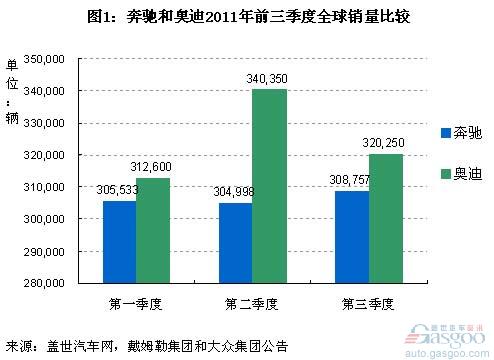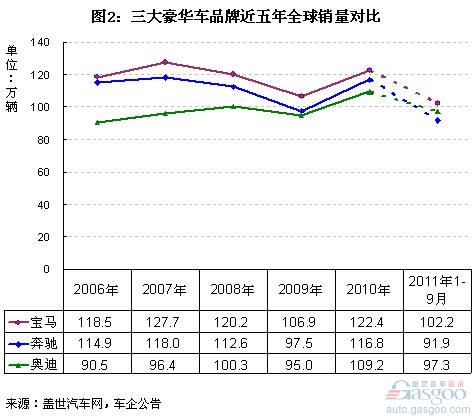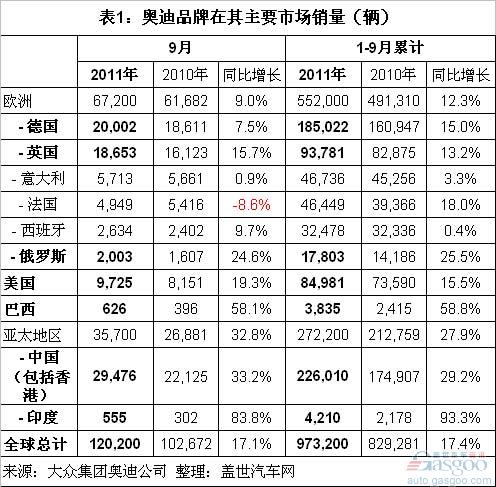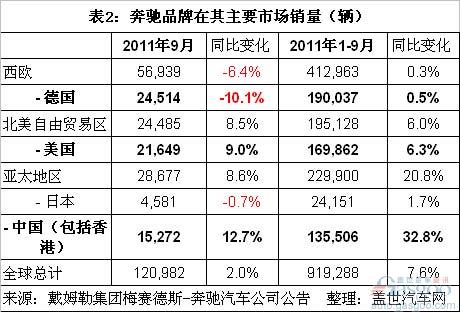
In the first three quarters, Audi's global sales amounted to nearly 10,000 units, which was 973,200 units, which represented a year-on-year increase of 17.4%. The Mercedes-Benz brand's global sales volume was only 913,300 units, an increase of 7.6% year-on-year; and BMW's global sales volume has exceeded one million units. 102.19 million vehicles, a year-on-year increase of 14.5%.

With this trend, Audi sales this year or for the first time will exceed the Mercedes-Benz brand, while the BMW brand will remain the first. In fact, before sales were released in September, Audi forecasted that its annual sales will reach 1.3 million, which exceeds the global sales of the BMW brand last year (122.4 million). The BMW brand expects its sales this year will exceed 1.6 million.
Global Sales Distribution: Fastest Growth in the BRICs For the BMW Group, the top three markets are Germany, the United States, and China. Among them, the Chinese market has the fastest growth in sales. In the first three quarters of this year, the total sales volume of BMW Group (including MINI brand) in mainland China reached 177,500 units, an increase of 45.7% year-on-year, of which BMW brand sales volume was 165,700 units, an increase of 44.8% year-on-year. In September, the sales volume of the BMW Group in mainland China was 18,600 units, a year-on-year increase of 20.9%.
In the other three countries of the BRIC countries, BMW Group's sales also grew rapidly, and due to its small base, the growth rate was significantly higher than sales in China. In September, sales of BMW Group in Russia, Brazil and India increased by 33.2%, 80.3% and 41.5% respectively year-on-year to 2,683 units, 1,700 units and 972 units.
For Audi, China (including Hong Kong) has become the world’s largest market in the first three quarters of this year. Its cumulative sales in China from January to September totaled 226,000 vehicles, which is 41,000 more than its sales in Germany of 185,000. In September, Audi sold 29,500 vehicles in China, nearly 10,000 more than it sold in Germany. Its third and fourth largest markets in the world are the United Kingdom and the United States. In the first three quarters of this year, sales in these two countries were respectively 93,800 vehicles and 8,500 vehicles, which was significantly lower than their sales in China and Germany.

In Audi's top four markets, the fastest growing sales volume is in China. Accumulated sales in January-September of this year and September sales in September were 29.2% and 33.2% year-on-year, respectively. From the perspective of other major markets listed by the company, it has higher growth in both the Indian and Brazilian markets, but the absolute value of sales is still low. From January to September, Audi sales in India and Brazil increased by 93.3% and 58.8% year-on-year to 4,210 vehicles and 3,835 vehicles respectively. In September, sales in India and Brazil increased by 83.8% and 58.1% year-on-year to 555 and 626 vehicles, respectively. In addition, its sales in Russia also had a relatively high growth - a 25.5% year-on-year increase to 17,800 units in January-September and a 24.6% year-on-year increase to 2003 in 2003.
Like BMW, the top three Mercedes-Benz brands in the first three quarters of this year were also Germany, the United States, and China (including Hong Kong). Among them, China's sales grew fastest, with a year-on-year growth of 32.8% to 135,500 units in the first three quarters.

In September, sales of the Mercedes-Benz brand in China increased by 12.7% year-on-year to 15,300 vehicles. The market in Brazil, Russia, and India achieved higher growth than in China, with September's year-on-year growth rates of 64.8%, 44.6%, and 14.1%, respectively.
Note:
1. Unless otherwise specified, the sales data in this article are taken from the data listed in the news bulletins of the auto enterprises of each brand. In Figure 1, the Mercedes-Benz brand's sales of 1.168 million units in 2010 were taken from the company's January 2011 announcement, while in the Daimler 2010 annual report, its sales volume showed 1.178 million units.
2. The Mercedes-Benz brand sales only refer to the Mercedes-Benz brand sales of the Daimler Group's Mercedes-Benz (excluding the smart brand), not including the Mercedes-Benz light commercial vehicle company's Mercedes-Benz brand sales.
3. BMW brand sales refer to the sales of BMW Group BMW brand cars, not including the MINI and Rolls-Royce brands, nor does it include motorcycle sales.
The development of door hardware accessories is closely related to the evolution of the door and the way of opening the door, the reason of the revolution of the door hardware is from consciousness of door function and convenience to use the door. The accurate description of the development history of door hardware requires a lot of work, here we only rational suppose the development procedure of the door hardware which is driven by the demand of mankind. when the use of glass by humans has not yet been universal, door is used for lighting and for the people at a distance or watch the outside world.
Door Hardware,Zinc Die Casting Door Handle,Zinc Die Casting Door Knob,Zinc Die Casting Door Hinge
NINGBO ZHENHAI BOLANG METAL PRODUCT FACTORY , https://www.aldiecastings.com